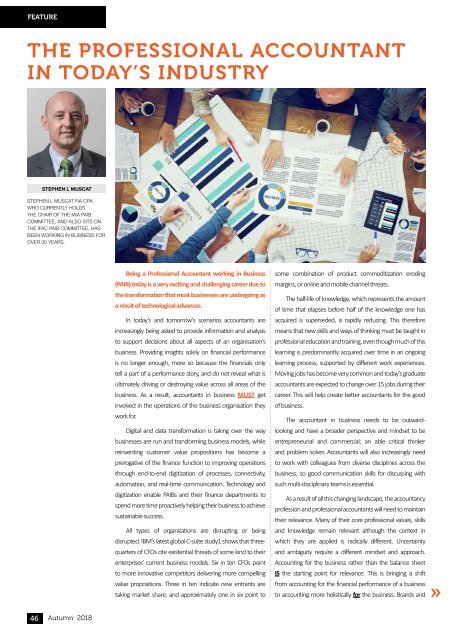THE ACCOUNTANT_AUTUMN_2018_VER-7-L
Create successful ePaper yourself
Turn your PDF publications into a flip-book with our unique Google optimized e-Paper software.
FEATURE<br />
<strong>THE</strong> PROFESSIONAL <strong>ACCOUNTANT</strong><br />
IN TODAY’S INDUSTRY<br />
STEPHEN L MUSCAT<br />
STEPHEN L MUSCAT FIA CPA,<br />
WHO CURRENTLY HOLDS<br />
<strong>THE</strong> CHAIR OF <strong>THE</strong> MIA PAIB<br />
COMMITTEE, AND ALSO SITS ON<br />
<strong>THE</strong> IFAC PAIB COMMITTEE, HAS<br />
BEEN WORKING IN BUSINESS FOR<br />
O<strong>VER</strong> 30 YEARS.<br />
Being a Professional Accountant working in Business<br />
(PAIB) today is a very exciting and challenging career due to<br />
the transformation that most businesses are undergoing as<br />
a result of technological advances.<br />
In today’s and tomorrow’s scenarios accountants are<br />
increasingly being asked to provide information and analysis<br />
to support decisions about all aspects of an organisation’s<br />
business. Providing insights solely on financial performance<br />
is no longer enough, more so because the financials only<br />
tell a part of a performance story, and do not reveal what is<br />
ultimately driving or destroying value across all areas of the<br />
business. As a result, accountants in business MUST get<br />
involved in the operations of the business organisation they<br />
work for.<br />
Digital and data transformation is taking over the way<br />
businesses are run and transforming business models, while<br />
reinventing customer value propositions has become a<br />
prerogative of the finance function to improving operations<br />
through end-to-end digitization of processes, connectivity,<br />
automation, and real-time communication. Technology and<br />
digitization enable PAIBs and their finance departments to<br />
spend more time proactively helping their business to achieve<br />
sustainable success.<br />
All types of organizations are disrupting or being<br />
disrupted. IBM’s latest global C-suite study1 shows that threequarters<br />
of CFOs cite existential threats of some kind to their<br />
enterprises’ current business models. Six in ten CFOs point<br />
to more innovative competitors delivering more compelling<br />
value propositions. Three in ten indicate new entrants are<br />
taking market share, and approximately one in six point to<br />
some combination of product commoditization eroding<br />
margins, or online and mobile channel threats.<br />
The half-life of knowledge, which represents the amount<br />
of time that elapses before half of the knowledge one has<br />
acquired is superseded, is rapidly reducing. This therefore<br />
means that new skills and ways of thinking must be taught in<br />
professional education and training, even though much of this<br />
learning is predominantly acquired over time in an ongoing<br />
learning process, supported by different work experiences.<br />
Moving jobs has become very common and today’s graduate<br />
accountants are expected to change over 15 jobs during their<br />
career. This will help create better accountants for the good<br />
of business.<br />
The accountant in business needs to be outwardlooking<br />
and have a broader perspective and mindset to be<br />
entrepreneurial and commercial; an able critical thinker<br />
and problem solver. Accountants will also increasingly need<br />
to work with colleagues from diverse disciplines across the<br />
business, so good communication skills for discussing with<br />
such multi-disciplinary teams is essential.<br />
As a result of all this changing landscape, the accountancy<br />
profession and professional accountants will need to maintain<br />
their relevance. Many of their core professional values, skills<br />
and knowledge remain relevant although the context in<br />
which they are applied is radically different. Uncertainty<br />
and ambiguity require a different mindset and approach.<br />
Accounting for the business rather than the balance sheet<br />
IS the starting point for relevance. This is bringing a shift<br />
from accounting for the financial performance of a business<br />
to accounting more holistically for the business. Boards and<br />
46 Autumn <strong>2018</strong>
















